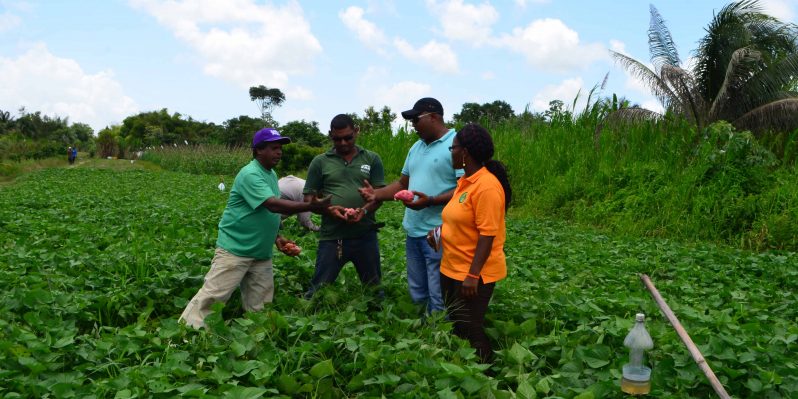
Dedicated extension officers of the National Agricultural Research and Extension Institute (NAREI) have been venturing into farming communities across Guyana, transferring technology and providing answers to cash crop farmers through the Farmers Field School.
What is the Farmers Field School?
As the name suggests, the Farmers Field School (FFS) is an informal field setting where farmers learn and exchange ideas. It is not unique to Guyana. The FFS was developed by the Food and Agricultural Organization (FAO) and partners 25 years ago.
According to the FAO, farmers, with guidance from a trained facilitator, meet as a group once a week in a field setting throughout a cropping season. There, they observe and compare two plots, one being the local conventional method of farming whilst the other is the experimental plot.
The FFS is conducted in a similar manner in Guyana. NAREI has been constructing demonstration plots on privately owned farms. They are maintained by both extension staff and the farmers. Depending on the crop maturity rate NAREI arranges the FFS. The FFS are done to inform farmers of the technologies used to produce the crop and compare NAREI’s plot against that produced using the farmers’ practice. While the FFS is not done weekly farmers are welcome to visit the plots.

Demonstration plots
Only recently, NAREI conducted a FFS at Parika Backdam, East Bank Essequibo, benefitting over 20 cassava and sweet potato farmers. The interactions were held on the farms of Sudesh Baldeo and Kapeldeo Rampersaud, where cassava and sweet potatoes are grown, respectively.
The cassava project is being done to determine whether bio stimulants and adequate irrigation would increase yield. Meaningful exchanges were made and harvesting was done to see root progression. The project received approval from most of the farmers, but a few farmers boasted of having bigger roots than that of the experimental plot.
The sweet potato project was also done to determine whether adequate irrigation would increase productivity. A sprinkler irrigation system was installed on the demonstration plot. Farmers were impressed with the size and quality of the sweet potato produced.
Rampersaud is pleased that the project was being implemented on his farm. He is of the view that the information disseminated by NAREI helps to improve farmers’ knowledge.
Rampersaud appreciates the more farmer friendly way of these sessions since they allow farmers to express their opinions.
The use of demonstration plots together with the FFS is likely to increase as NAREI seeks to take technology and innovation to farmers. They will definitely help to achieve the Ministry of Agriculture’s aim of organizing the non-traditional sectors to perform as that of rice and sugar.
Already, the FFS has been recording success stories of better pest and disease management, incorporation of good farming practices, greater productivity and improved living standards of farmers.












